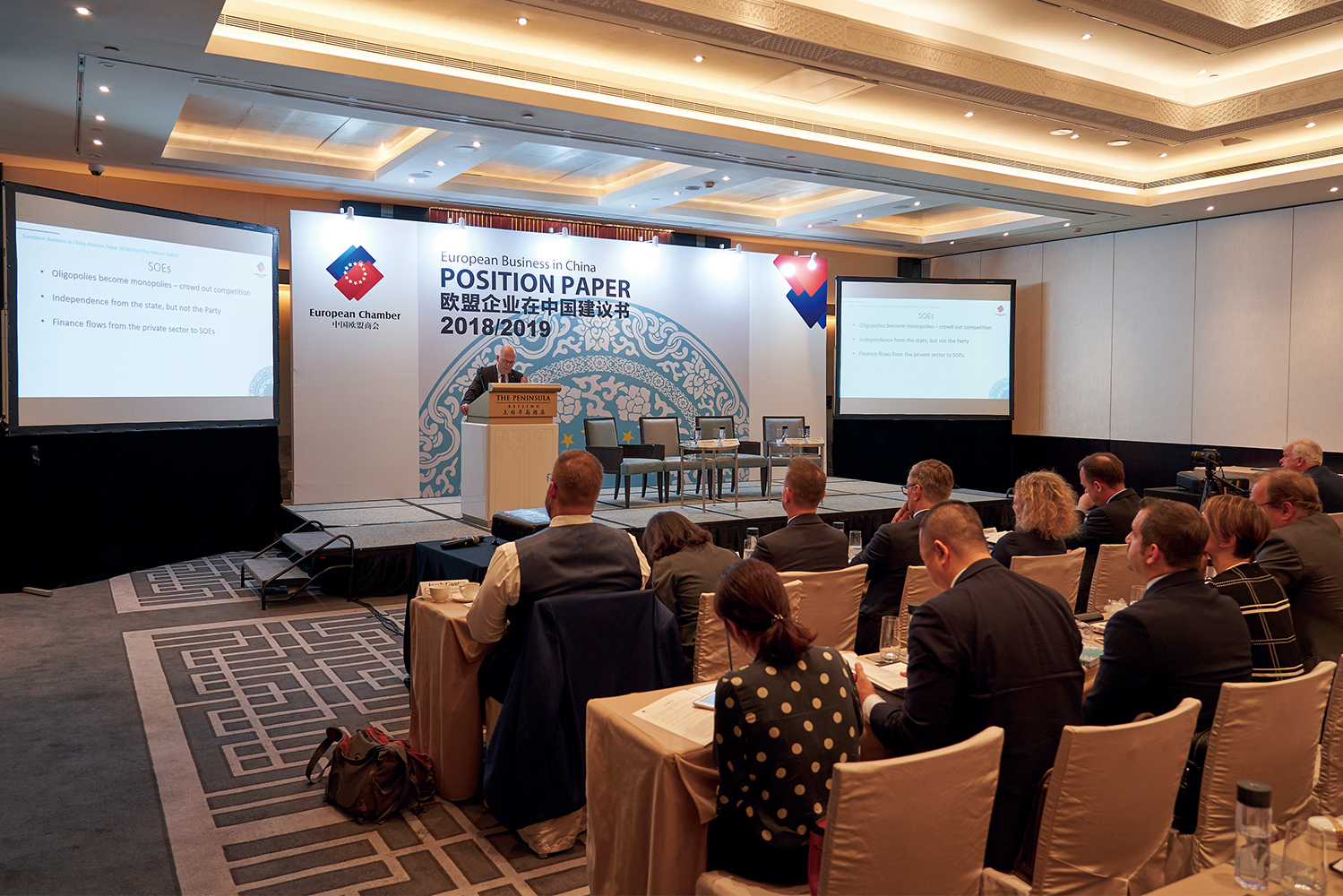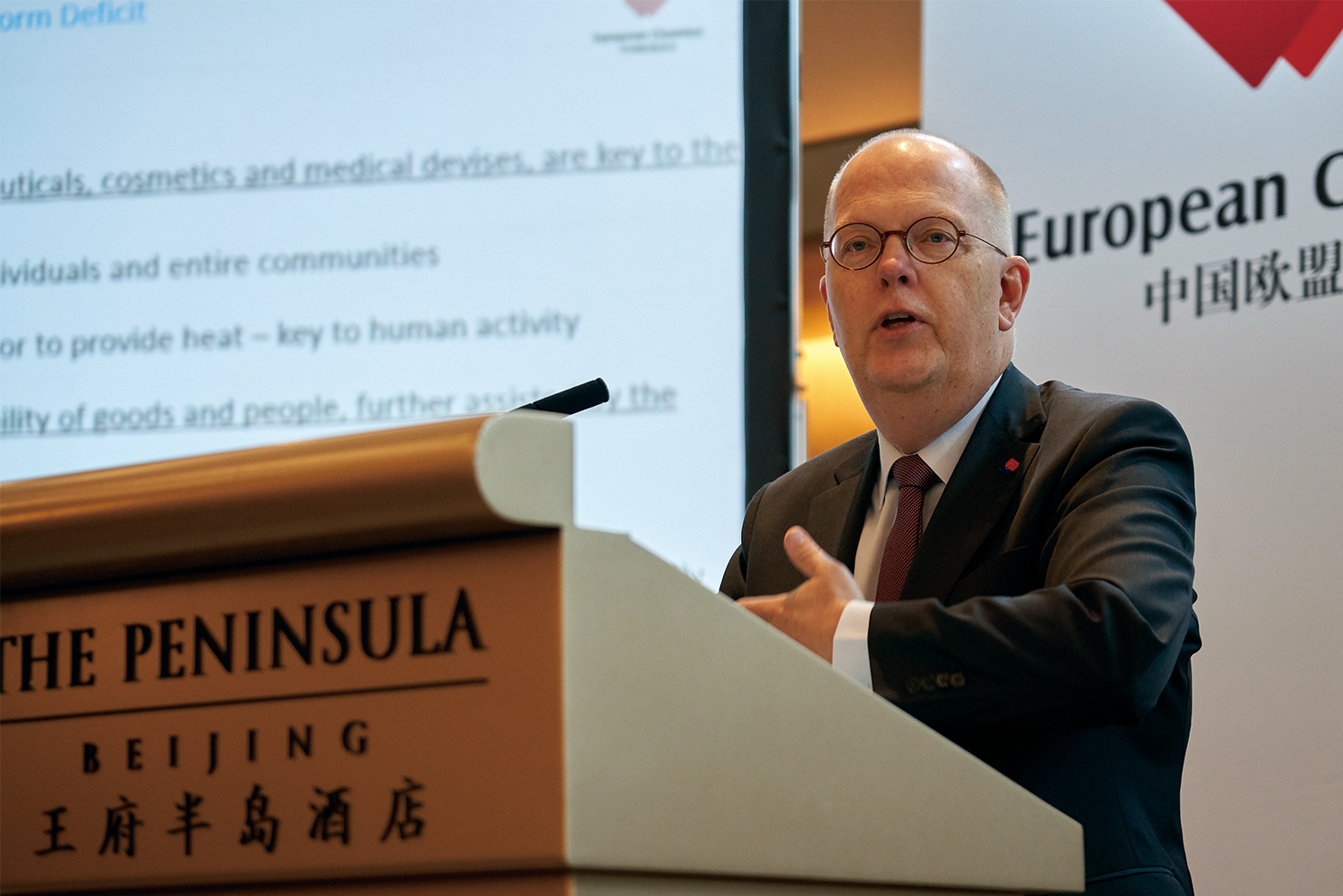 European Business in China Position Paper 2018/2019
European Business in China Position Paper 2018/2019
On 18th September 2018, the European Chamber published its European Business in China Position Paper 2018/2019 (Position Paper), which examines the ever-widening gap between China’s rapidly maturing economy and the shortcomings of its reform agenda. It identifies the most significant limitations on European businesses operating in China that prevent them from efficiently providing goods and services demanded by their customers. The difference between the recent promises that have been made by China’s leadership and the actual results on the ground for international enterprises has formed a ‘reform deficit’, resulting in increased global tensions that have now manifested themselves in the US-China trade war. The Position Paper provides 828 specific recommendations that can help China achieve its next level of development while mitigating external conflicts.
China has made great strides in implementing an agenda that began 40 years ago at the Third Plenum of the 11th Party Congress when Deng Xiaoping embarked upon the Reform and Opening Up period. While that anniversary is being widely celebrated in 2018, the commemoration of another Third Plenum has gone largely unobserved. Five years ago, the Third Plenum of the 18th Party Congress issued the Decision that, among other things, emphasised the decisive role of the market in allocating resources and the need for development to be people-centred.[1] As it was the first plenum after Xi Jinping’s assumption of the presidency, it was a critical moment that carved into stone the vision for China’s economic development over the following years.
In the last half decade, improvements have been made in a variety of areas: tariffs on many consumer goods were slashed in late 2017 and early 2018 to provide greater access to goods demanded by Chinese consumers; environmental protection, a long-standing concern of the Chinese middle class, was ramped up in 2014, resulting in a 32 per cent drop in fine air particulates across much of the country;[2] and international pharmaceuticals and medical devices have seen market access expanded through smoother approval systems and fewer barriers over the last two years, as demand has sharply risen for better quality healthcare.
Several encouraging results also came out of the annual EU-China Summit in 2018. Chief among them were an exchange of market access offers as part of the Comprehensive Agreement on Investment (CAI), an initial agreement on geographical indicators and a decision to establish a working group to explore potential reforms to the World Trade Organization (WTO).[3]
However, despite these areas of welcome progress there are unignorable shortcomings that all represent missing pieces of China’s reform jigsaw. These were covered at length in the European Chamber’s most recent report, 18 Months Since Davos How China’s Vision Became a Reform Imperative, but the European business community is by no means the lone voice of concern.[4] The strong reaction from the United States with its escalation of tariffs is, albeit undesirable, a direct response to these deficiencies, many of them longstanding. Even the Chairperson’s concluding remarks on the WTO’s 2018 Trade Policy Review and the more than 1,900 questions raised by other members reflect the international community’s mixed feelings towards the situation and indicate that concerns about China’s role in the global economy are widespread.[5] These concerns derive from issues such as unfair technology transfers, a lack of investment reciprocity and concerns over how the China Manufacturing 2025 initiative will be pursued. China may think this criticism unfair, but its sheer size means that its unfair trade and investment practices will have global repercussions.
The extent to which the core principles of the Decision have been implemented can be evaluated with a simple question that cuts to the main purpose of open markets and the most fundamental needs of Chinese consumers:
Can all international companies operate on a level playing field in China to provide the goods and services that are being demanded?
As it stands, the answer is a clear ‘no’. Some of the reasons for this are obvious and immediate: market access barriers, unequal access to subsidies, a dearth of licences for international firms, differentiated treatment and sectors crowded out by monopolistic state-owned-enterprises (SOEs) regularly dominate headlines. However, less obvious factors also contribute to a business environment that remains out of synch with the promises made at the Third Plenum. Concerns like lengthy administrative procedures, non-transparent procurement systems, unpredictable enforcement of regulations and issues arising from poor inter-governmental coordination all inhibit smooth business operations, reduce opportunities for European investors and chip away at confidence in the Chinese market. Some of these challenges are due to state policy, others appear to be a result of lower levels of government either not fully comprehending, or failing embrace, the principles of the Decision. Recognising these difficulties, European firms nevertheless expect results.
The negative consequences of these issues run deep. For example, while barring market access in any given sector deprives Chinese customers from the specific goods or services that international enterprises could provide, much greater damage is caused to China’s economy by the resulting lack of competition on which thriving market economies rely. Other impacts exist at a seemingly smaller, but no less important scale. Highly specific standards out of line with international norms, for example, may limit the availability of certain goods that cater to the increasingly complex tastes of China’s rising middle class, the growing needs of its rapidly ageing population or the developmental necessities of its more sophisticated economy.
The persistence of these issues not only calls into question the decisive role of the market and the people-centred nature of development, collectively they also compose a ‘reform deficit’.
China’s ambitions to become a champion of globalisation have been repeatedly espoused since President Xi spoke at Davos in January 2017 and are welcomed by European businesses. However, the continuation of limited reciprocity has for some time been building mistrust as an increasing number of political leaders and voters around the world see China as taking advantage of the situation. It is therefore incumbent on the Chinese Government to accelerate the pace of reform and to begin to bridge the increasing gap between potential and reality. The recommendations contained in this report are intended provide the Chinese Government with concrete suggestions on how to address the shortcomings of the reform agenda set out at the Third Plenum and to begin significantly reducing the reform deficit.
At the heart of these recommendations is the need for Chinese leaders to consider the fundamental purpose of the different sectors of its economy. Just as the underlying social value of business is to provide in a responsible way goods and services demanded by customers, each industry has an important social contribution to make as well. By using this as the starting point, Chinese officials can begin the process of reappraising how the regulatory environment can be improved to allow each respective industry to fulfil its core task to its maximum potential. To begin this process each of the European Chamber’s working groups have described in their respective position papers the essential role that they play in the economy.
By approaching reform from this more holistic perspective, China can begin to dismantle the barriers currently preventing European enterprises from fully contributing to its economy, and those that exist between customers, and the goods and services that they are demanding.
[1] Decision of the Central Committee of the CCP on some major issues concerning comprehensively deepening reform, China.org, 16th January 2014, viewed 2nd August 2018, <http://www.china.org.cn/china/third_plenary_session/2014-01/16/content_31212602.htm>
[2] Greenstone, Michael, Four Years After Declaring War on Pollution, China Is Winning, The New York Times, 12th March 2018, viewed 2nd August 2018, <https://www.nytimes.com/2018/03/12/upshot/china-pollution-environment-longer-lives.html>
[3] Joint statement of the 20th China-EU Summit, Ministry of Foreign Affairs, 16th July 2018, viewed 3rd August 2018, <http://www.fmprc.gov.cn/mfa_eng/zxxx_662805/t1577516.shtml>
[4] 18 Months Since Davos: How China’s Vision Became a Reform Imperative, European Union Chamber of Commerce in China, 10th July 2018, viewed 3rd August 2018, <http://www.europeanchamber.com.cn/en/publications-18-months-since-davos>
[5] Trade policy review: China, Concluding remarks by the Chairperson, WTO, 11th and 13th July 2018, viewed 3rd August 2018, <https://www.wto.org/english/tratop_e/tpr_e/tp475_crc_e.htm>



Recent Comments